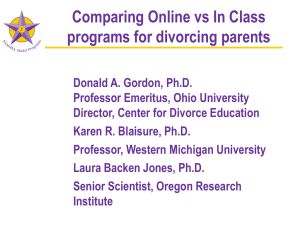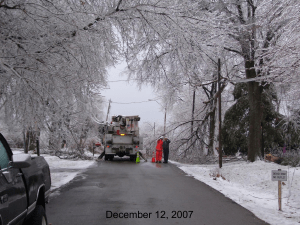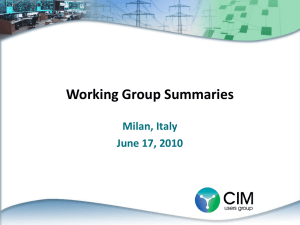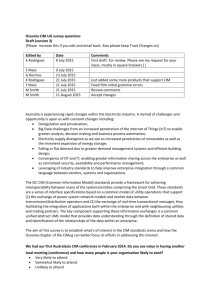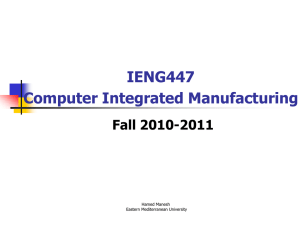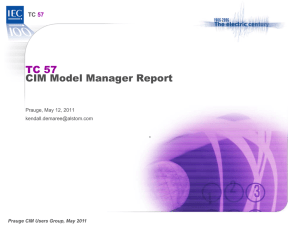08-CEPS - CIMUserGroupPrague1
advertisement
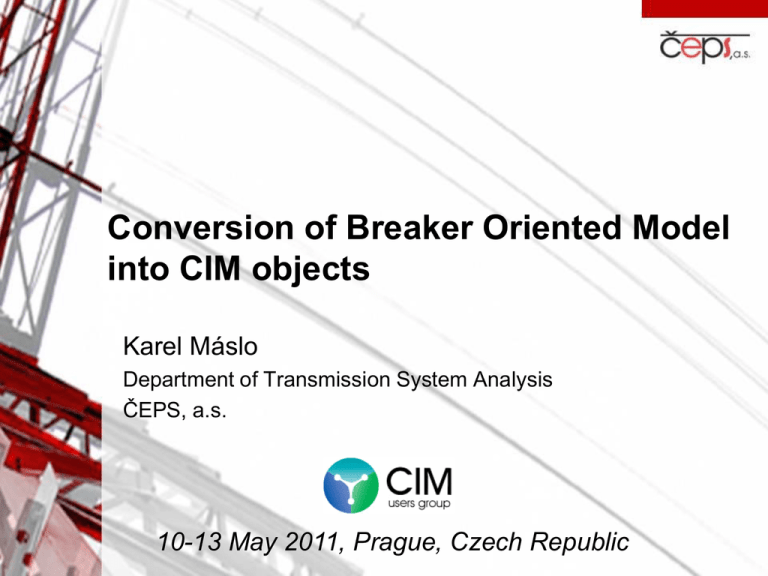
Conversion of Breaker Oriented Model into CIM objects Karel Máslo Department of Transmission System Analysis ČEPS, a.s. 10-13 May 2011, Prague, Czech Republic Contents ENTSO E CIM – Model Exchange Profile CIM Using for EMS Applications Dispatcher Training Simulator -DTS Basic network model – BROM versus BOM Extended model – protections and automatics Migration to CIM Conclusions Comparing data format UCTE - DEF 1. 2. 3. kB versus MB of data transparent versus unreadable easy transfer to other formats versus !?! CIM EMS Application Dispatcher Training Simulator - DTS 483-6 EDU 43 EDA G EK V RE_HR HRT G T logik a M Motoric uz ký el FR_ODL I> automat ika P,Q=f(U,f,t) S G D = G T_1 _1 DIE C HY S DR DMES Power system Application 1 Application N S E"=var.,f=var. _A T NU S EX _ T C CL A _4 C SCADA LFC S _A BO T IL A G _1 C Telemetry model SCADA State Estimation Application 1 Application N 436 435 433 SLAVĚTICE 4 ČEBÍN DASNÝ 481 MÍROVKA 482 2 42 Telemetry Stupava 424 4 42 3 SOKOLNICE 497 DTS Dynamic model of Electric Power System Križovany OTROKOVICE 251 17 252 418 PROSENICE EMS Bus Oriented Model - “BOM” KRA4 Network model NOS4 V402 V403 PRN_400 REP4 SP V413 V418 T401 OTR4 PRN4 Detailed topology Breaker Oriented Model “BROM” Extended models of protections and automatics Primary side Busbars Protections Protections I> ST ON I> OFF D O DP P OFF Transformer UHV/VHV DP OFF Synchronisation DP equipment Protected line ST Reverse direction ON Secondary side Busbars Transformation from BROM through Bay Object to BOM BROM CIM CN 1 W2 W1 CN 2 Node Bay W5 Feeder BOM CN 3 Busbar coupler AClineSegment Real structure Branch Bay A collection of power system resources (within a given substation) including conducting equipment, protection relays, measurements, and telemetry More complex substations topology Bay 4/3 up to 7 terminals 2 for junctions 5 for real busbars 3/2 Polygon Migration to CIM Nodes Nodes Switches Switches Feeders Feeders Lines Compensators Bays Lines Input Files Compensators Transformers Transformers Generators Generators Voltage Control Loads Dynamic Models Dynamic Parameters Automatics DTS Structures Present state Voltage Control Loads Input Files CIM ?? Input Files Dynamic Models Dynamic Models Dynamic Parameters Dynamic Parameters Automatics DMES DTS Structures 1st step DMES DTS CIM compatible ??? DMES Bay Object Advantages • Decreasing of nodes and branches numbers : • About 70% of nodes are junctions in substations • About 75% of branches are switches Busbars Protections I> ST ON D O DP P Synchronisation equipment Protected line • Simplification protection model data • …. Conclusions DTS is one from the most complex application in EMS It requires huge input data to simulate real power system – Load flow data – Protection, automatics and control equipment data – Dynamic model data Creating Bay object is the first step to using CIM This way will be long and probably distressful But it is useful and perhaps necessary Thank you for your attention and in advance for help Conclusions Well Unbundled Connectivity Karel Máslo Head of Transmisson System Analysis Department ČEPS, a.s Elektrárenská 774/2 Praha 10 Czech Republic maslo@ceps.cz www.ceps.cz DTS Architecture DTS Network simulator MODES DMES Prologue INPUTS LFC ST _A BOIL Kompetn í dynamick ý model E"=var., f=var. ST _A G ST _EXC INPUTS NUCL AC _1 Simulation AC _4 Transfer into DLL G EKV REG _HRT HRT Computation engine Computation engine logika I> automatika M Motorický uzel FR_ODL Aktivní uzel P,Q=f(U,f,t) = G G ST _1 DC _1 HYDR GRAPHICS DIES Epilogue Observability and responsibility areas in the EMS Preilack MecklarEisenach Oberhaid Raitersaich Mukačevo . Paks G EKUCTE
